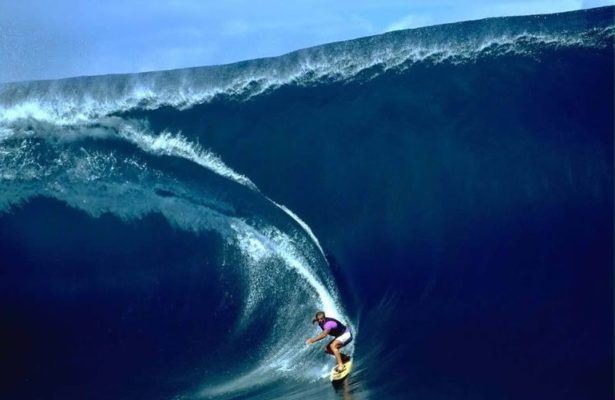2 minute read
Out Islands, Bahamas
“When the Competition Starts, the Art Stops.”
-Laird Hamilton
Competition with others is for Losers. Let’s be really honest with ourselves: competing with others is merely comparing ourselves with them. As high-performing Entrepreneur Owner-Managers, what do you achieve by competing with anyone? Competition or comparison has its roots in a world of scarcity. The entrepreneurial world is one of abundance.
Instead of comparing or competing, the best performing private business owners are almost always striving for an ideal or goal they set for themselves. They are almost never competing against others—why would they? They are striving to discover, unlock, and achieve their own peak potential.
EOMs frequently feel like aliens in their families, communities, and industries, nobody understands them except other top-performing EOMs like them. It’s great to be in a community (or even a room) with other EOMs who operate at the highest level because everyone “gets” what you are talking about. Virtually every EOM there has been through what you’ve been through; it’s all part of EOM life, it’s consistently inconsistent. In that EOM world it’s all collaboration, there’s no competition. It’s constantly inspiring and makes you want to do more and more cool stuff—not because you need more, but just because you keep discovering there is more and more cool stuff to unlock in yourself.
As a mass popular culture on the other hand, we are highly mimetic creatures. If we think we are in competition or comparison, then we are, and we copy what everyone else is doing. Inside a firm for example, team members can become obsessed with their competitors for so called advancement. Firms themselves (from the bureaucratic world) are utterly obsessed with competing in the marketplace. Social media. I don’t understand: why lose sight of what really matters to you, and focus on what matters to your rivals instead?
Sadly, much so-called “expert advice” reflexively begins and ends with input on how to compete against others that you compare yourself against. If we are in competition, we copy everyone around us. Why? Don’t you ideally want to end up specializing in being…you? Who can compete with you if you are leveraging your authentic Unique Ability? Focusing on our authenticity naturally gets us away from competition. If you’re building and marketing something which is an extension of who you are, who can compete with you on that? Hey, who’s going to compete with Amanda Palmer in her creative domain? This is easiest to see in art, but entrepreneurs are heavy-duty creatives too (the businesses and products they create are usually highly authentic to their desires and means). Preferably, you specialize in being you.
Laird Hamilton is widely regarded as the foremost big-wave surfer in the world. In addition to surfing the biggest waves, he is almost singlehandedly responsible for the current reinvention of stand-up paddle boarding, led the surfing community to foilboard surfing, and literally invented and developed tow-in surfing (in order to match the speed of the biggest waves). As an Entrepreneur Owner-Manager Laird recently led his nutrition company Laird Superfood to the public market (NYSE: LSM). Yet, he has never, and will never, enter surfing competitions. When I asked him why he doesn’t compete in surfing, he said, “Pete, I never enter any surfing or any other competitions. Because when the competition starts… the art stops. I am not out to compete against other surfers. And I would never try to compete with Mother Nature. I am simply discovering and trying to unlock my own potential out in Mother Nature. I don’t fully know what my potential is yet.”
James Carse’s classic book Finite or Infinite Games (2013) defines two kinds of contests. The book is basically about competition (finite games) vs. cooperation (infinite games), written in plain English without over-reliance on mathematics or complex game theory. Highly recommend. His position is that a finite game is played for the purpose of winning, an infinite game for the purpose of continuing to play. What’s your time frame in life?
One of the things that illustrates the uselessness of win-lose competition or comparison is when the “currency” is “status.” For example, that’s the currency that politicians and academics and celebrities and…EOMs who compete… move in. It’s a zero-sum game where for me to be higher status than you, you have to be lower status than me or vice versa. To win in tennis playing against me, you must beat me. What a tragedy that to be your best or to unlock your unique potential, you believe you must compete or beat someone else? The real danger of status games or other finite games is that it may be that we end up competing for something that we didn’t want. We may not realize until later that we were trapped into competing—and we didn’t want to win the game anyway.
So, when you learn you want to go beyond compete or compare, what can you do? Unique Ability is one of those things that can be learned, but not taught. Certainly not by competing or comparing. Find some quiet, and try to answer these questions: Where do you bring the most value? What are you passionate about or better… wired for? Where can you have an economic model that is self-sustaining? You don’t have to compete with others. Authenticity naturally gets you away from competition. Ideally you want to end up specializing in being you.
In the Entrepreneurial Economy, the masses are never right. No matter what you learned on the kickball court, competitive rivalry isn’t merely a good-humored contest. It’s poison. Poison to creativity, poison to discovering your Unique Ability, poison to Subjective Well-Being. Comparison of ourselves versus others causes us to emphasize old historical dogma and slavishly copy what has worked in the past.
Is what makes the highest-performing Entrepreneur Owner-Managers born or learned? We don’t know. But we know this: you can work on your mindset every single day.
The competition or comparison mindset has its roots in a world of scarcity. As EOMS, do we “get” we are in a world of abundance?
"Comparison is the thief of joy."
–Theodore Roosevelt
What I am Reading / Listening to
Freedom (2021)
By Sebastian Junger
Sebastian Junger’s new little book Freedom (2021) is wonderfully simple, brief, and reflective; its 133 pages are full of life lessons. If you are on a boat or at the beach, and in the mood for contemplation, you can read it in one sitting.
The book is broken into three short parts: Run, Fight, and Think as three ways that homo sapiens over time have achieved and sustained freedom. If you are a high-performing Entrepreneur Owner-Manager, I bet you will resonate with just how clear it is to you that compared to the “bureaucratic world” you are a lot more free. But being a lot more free implies more danger, or less comfort and safety. What is bureaucracy? It’s a loss of freedom. There is a great deal in this book that speaks to us as business owners in the mass popular society we live in today.
Plus, who knew the author of The Perfect Storm (1997) was such a beautiful wordsmith? I haven’t seen sentences like these since John McPhee or E.B. White.
“We walked around four hundred miles and most nights we were the only people in the world who knew where we were. There are many definitions of freedom but surely that is one of them.”
“The risks were appalling and the hardships unspeakable, but no government official would ever again tell you what to do.” (sounds like heaven to me - PRW)
“The great virtue of hunter-gatherer societies around the world was that, although the leaders understandably had more prestige than other people, they didn’t have more rights.”
“Women are the final component in defeating a dominant power. First and foremost they impart a kind of moral legitimacy to protest that could otherwise be dismissed as simple mayhem. And, like small men in a fistfight, they are often underestimated in ways that can be endlessly exploited against an overconfident adversary.”
“In modern democracies, however, an ethos of public sacrifice is rarely needed because freedom and survival are more or less guaranteed. That is a great blessing but allows people to believe that any sacrifice at all…”
Highly recommend this book. It makes you reflect on freedom we assume.
Entrepreneur Owner-Manager Quote
“My life is so bright that it's very overwhelming at times. However, I know none of this would have happened without some pretty incredible people stepping in for me. Bigelow did so much to make that happen, and I have so much gratitude for you all. So, thank you for helping me get to this beautiful part of life.”
-Janet Farris, Former Owner of Total Label USA, LLC
Energy Creation
Contributed by Amanda L. Sylvester
I am fortunate to be intrinsically motivated to run. However, since I am very analytical and Type-A, I used to run to hit mileage, hit pace, etc. It was always logged perfectly and curated to achieve my perfect run week, month, or year. Until I hit a wall.
One day off, turned into one week off, which quickly snowballed into a few months of not doing the one thing that made me feel like…well, me. Daily, I would try convincing myself that I wanted to run, but when it came down to actually lacing up, my body would wave it’s imaginary white flag—so home I stayed.
It wasn’t until I noticed a young woman on my drive home from work one evening, she was running through downtown Portsmouth with this ear-to-ear smile. She wasn’t particularly fit or fast, but wow did she have a contagious joy about her. I imagined her rocking out to her favorite song, not having a single care in the world. In that exact moment, I realized where I had gone wrong—I had forgotten to actually have FUN while running.
That same evening, I walked in the door, dropped my work bag, and dusted off my favorite pair of Brooks. I didn’t have a set number of miles in mind, I didn’t let myself worry about pace, I didn’t even wear my Apple watch (that’s a big deal for me) —I just pressed play on my favorite playlist and started running.
7 miles later, I had my answer. Nothing I had been paying attention to the previous 10 years mattered. Now, this probably sounds sort of depressing, but it was one of the most liberating realizations I have ever had. I had become so consumed by the numbers that show up on my watch when I hit “end run,” that I had stopped finding the joy in what I was doing.
I was letting my goals have power over me, rather than having power over my goals.
Today, I have a different approach to running—rather than stressing over the metrics, I tune into myself mentally and physically, I run based on my perceived effort, and I can finally say that I find joy in every mile.




